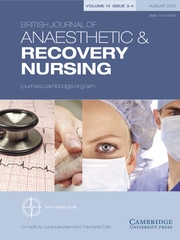Earlier in the year, I was approached by someone in the process of organising a career conference for a girl's school. Among the speakers already scheduled, were a lawyer, a journalist and investment banker. I was asked if I wouldn't mind coming to speak to the girls about the nursing profession, which of course I was delighted about. What an excellent opportunity to talk to a younger generation about, not just nursing, but our particular speciality and the new roles and opportunities that are now available.
I got straight away to planning my talk and how best to present a positive picture of nursing in this current climate. The next day I received another call. She had approached her boss about my proposed talk and been told that they already had a doctor attending and if the girls were going to go into healthcare, it would be to study medicine. This made me quite cross, and I don't think unreasonably so. The implication was clear that an intelligent girl wouldn't consider nursing as a career. I felt as though my whole profession had been disregarded and that some secret battle had just been lost.
This hurled me back to my school days when we were all choosing our careers. I remember talking to my Biology teacher about my options and that I was thinking about doing my nurse training. She did her best to discourage me, the implication being that I would be wasting my grades. Careers day was just the same, many occupations and professions were represented in the form of lectures, TV programmes, ‘question and answer’ sessions, even a trip to a factory, but no nurse representative. I wasn't alone, friends and colleagues tell me that they too weren't supported in their decision to train as a nurse.
This is not only sad for the profession as a whole, but also for the area of anaesthetics and recovery. First we have to fight to get the students into their training and then we are prohibited from even getting them through those theatre doors. How can we be expected to recruit nurses into this area if we are not exposing them to it during their training? Through them being denied this experience, theatres are left with a scary image, the unknown territory, a forbidden area, or simply just forgotten.
Governmental figures still show recruitment remains a very real challenge. I am becoming more and more concerned that potential nurses are faced with the newspaper clippings of closures and news headlines of job cuts. It is our professional right to be allowed to neutralise these images of our profession, and remind ourselves and others why we went into nursing in the first place. We may not be happy with present changes, we may not agree with Government policy, but our goals remain the same no matter what, and we shouldn't let the benefits of joining our profession be drowned out by politics.
This has prompted me to write to my old school and offer my services for the next career conference. I hope that reading this has made you as concerned as it did me and that it makes you think about what you can do for the future of your profession. We are not only patient advocates, but the advocates for our profession also.


